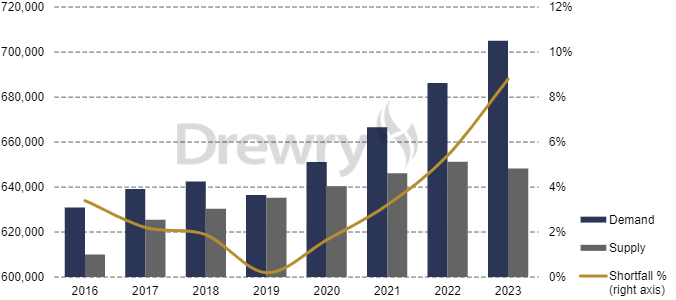Officer supply shortfall has reached a record high and is not expected to improve, leading to manning cost inflation, according to the latest Manning Annual Review and Forecast 2023/2024 report published by global shipping consultancy Drewry.
The 2023 officer availability gap has widened to a deficit equating to about 9% of the global pool, which represents a marked rise from last year’s 5% shortfall and the highest level since Drewry first started analyzing the seafarer market 17 years ago.
Employers are seeking alternative sources of supply to fill the gap, and wages have also begun to show more volatility
…. explained Drewry’s head of manning research, Rhett Harris.
According to Drewry, similar deficit levels are forecast for 2023-2028 based on the limits of new seafarer supply becoming available in the period. The seafarer labour market has become particularly tight, with important implications for recruitment and retention as well as manning costs.
Covid-19
The effects of Covid-19 are still persistent, as it not only had a substantial impact on crew training but also on the overall appeal of working at sea. This was mainly due to the various stories of crews stuck on board vessels, too often in dire conditions, Drewry notes.
According to SAFETY4SEA’s Crew Welfare Survey on the subject:
- 75% of seafarers stated the pandemic meant they were not receiving regular visits from shoreside personnel.
- 62% of seafarers felt their health and safety was not being balanced appropriately with operational demands.
- 54% of seafarers felt they were not being actively helped to manage stress and fatigue during the pandemic.
War
The most challenging period of the pandemic had hardly ended when the eruption of the Russia-Ukraine war created further challenges in seafarer supply, with many experienced crews returning home to join the military. Unfortunately, according to Drewry’s forecast, there is no end in sight to the war currently, so numbers of new seafarers from Russia and Ukraine are expected to be very limited for a while.
Communication
Drewry highlights that the importance of wellbeing has come to the forefront in employee retention, and the trend of looking beyond wage rates is becoming stronger by the day. Things like good communication channels with families at home, comfortable facilities onboard and a supportive work environment are gaining importance.
As part of its SEAFiT programme, SAFETY4SEA asked maritime experts to answer what they consider the most important factor impeding social interaction onboard. Remoteness from home and close friends/family was one of the most popular answers (15%) as well as the lack of team bonding and team activities (16%).
While vessel manning will be challenging over the few next years, especially with regard to officer availability because of these issues, the accelerating growth of the global deep sea vessel fleet will make the situation even more difficult, Drewry warns.
While sectors like containerships and offshore supply vessels have already seen increasing wage rates due to the strength of the sectors, we expect wage cost to accelerate for other vessel types as well.
… said Rhett Harris, Drewry’s head of manning research



































































